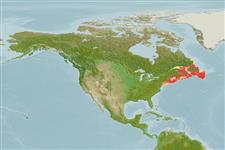Environment: milieu / climate zone / depth range / distribution range
Ecología
marino demersal; rango de profundidad 1 - 110 m (Ref. 5951). Temperate; 55°N - 39°N, 75°W - 49°W
Western Atlantic: southern Labrador in Canada to New Jersey in USA.
Tamaño / Peso / Age
Maturity: Lm ? range ? - ? cm
Max length : 97.0 cm TL macho / no sexado; (Ref. 49746)
Burrows in soft muddy bottoms from shallow water to 110 m depth. Feeds mainly on benthic infauna found in and around its burrow system; its prey consisting of various amphipods, polychaetes, shrimp and small fish (Ref. 87300).
Life cycle and mating behavior
Maturities | Reproducción | Spawnings | Egg(s) | Fecundities | Larva
Robins, C.R. and G.C. Ray, 1986. A field guide to Atlantic coast fishes of North America. Houghton Mifflin Company, Boston, U.S.A. 354 p. (Ref. 7251)
IUCN Red List Status (Ref. 130435)
Threat to humans
Harmless
Human uses
Herramientas
Special reports
Download XML
Fuentes de Internet
Estimates based on models
Preferred temperature (Ref.
123201): 0.9 - 12.2, mean 6.4 °C (based on 135 cells).
Phylogenetic diversity index (Ref.
82804): PD
50 = 0.6250 [Uniqueness, from 0.5 = low to 2.0 = high].
Bayesian length-weight: a=0.00102 (0.00046 - 0.00225), b=3.06 (2.88 - 3.24), in cm total length, based on all LWR estimates for this body shape (Ref.
93245).
Nivel trófico (Ref.
69278): 3.0 ±0.1 se; based on size and trophs of closest relatives
Fishing Vulnerability (Ref.
59153): High vulnerability (59 of 100).
Nutrients (Ref.
124155): Calcium = 34.6 [19.4, 59.2] mg/100g; Iron = 0.37 [0.21, 0.62] mg/100g; Protein = 18.3 [17.4, 19.2] %; Omega3 = 0.338 [0.186, 0.601] g/100g; Selenium = 23 [12, 46] μg/100g; VitaminA = 5.31 [1.53, 18.73] μg/100g; Zinc = 0.523 [0.373, 0.732] mg/100g (wet weight);
